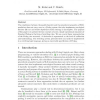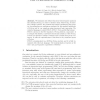140
click to vote
CORR
2010
Springer
14 years 11 months ago
2010
Springer
The paradigm of Tabled Logic Programming (TLP) is now supported by a number of Prolog systems, including XSB, YAP Prolog, B-Prolog, Mercury, ALS, and Ciao. The reasons for this ar...
120
click to vote
PPDP
2010
Springer
14 years 12 months ago
2010
Springer
Most Prolog implementations are implemented in low-level languages such as C and are based on a variation of the WAM instruction set, which enhances their performance but makes th...
133
click to vote
CORR
2002
Springer
15 years 1 months ago
2002
Springer
It is next to impossible to develop real-life applications in just pure Prolog. With XPCE [5] we realised a mechanism for integrating Prolog with an external object-oriented syste...
110
click to vote
ENTCS
2000
15 years 1 months ago
2000
The coincidence between the model-theoretic and the procedural semantics of SLDresolution does not carry over to a Prolog system that also implements non-logical features like cut...
134
click to vote
CORR
2007
Springer
15 years 1 months ago
2007
Springer
Prolog is an excellent tool for representing and manipulating data written in formal languages as well as natural language. Its safe semantics and automatic memory management make...
111
click to vote
CORR
2006
Springer
15 years 2 months ago
2006
Springer
Following the ideas of the Remote Procedure Call model, we have developed a logic programming counterpart, naturally called Prolog Remote Predicate Call (Prolog RPC) [1]. The Prol...
115
click to vote
CORR
2006
Springer
15 years 2 months ago
2006
Springer
Prolog Server Pages (PSP) is a scripting language, based on Prolog, than can be embedded in HTML documents. To run PSP applications one needs a web server, a web browser and a PSP...
113
click to vote
SPLST
2003
15 years 3 months ago
2003
We integrate user-defined functions with semantic equations into standard Prolog. In order to interface them with Prolog, we introduce a single operator. If a predicate invocation...
108
click to vote
ICLP
1995
Springer
15 years 5 months ago
1995
Springer
We present the wamcc system, a Prolog compiler that translates Prolog to C via the WAM. This approach has some interesting consequences: simplicity, efficiency, portability, exten...
152
click to vote
FLOPS
2004
Springer
15 years 5 months ago
2004
Springer
Abstract. This paper describes how high level implementations of (needed) narrowing into Prolog can be improved by analysing definitional trees. First, we introduce a refined repre...


